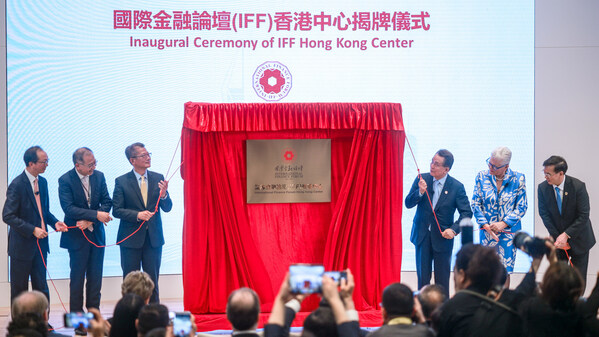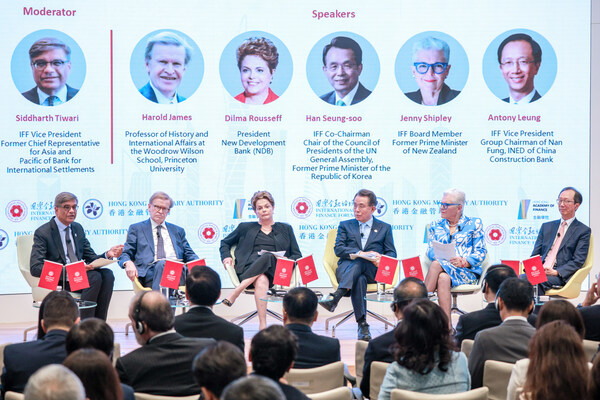HONG KONG, May 6, 2023 /PRNewswire/ — The International Finance Forum (IFF) together with the Hong Kong Monetary Authority (HKMA) and the Hong Kong Academy of Finance hosted on Friday a major conference on multilateralism and globalization as the world faces increased risks in the finance sector and fragmentation. As part of the 20th anniversary global conference series of the IFF, the conference invited political dignitaries, financial authorities, academics as well as executives from the finance sector to join two sessions in discussing topics including enhancing global cooperation, monetary polices, the challenges and opportunities for Hong Kong and the Greater Bay Area in an era of strategic competition. The IFF also launched its Hong Kong Centre during the conference.
Chief Executive of the Hong Kong Special Administrative Region (HKSAR) John Lee Ka-chiu, IFF Co-Chair and Chairperson of the Council of Presidents of the UN General Assembly Han Seung-soo and Financial Secretary of HKSAR Paul Chan Mo-po addressed the conference.
As part of its mission to strengthening global communication, the first IFF Hong Kong conference successfully addressed major global issues including geopolitical tensions, global debt crisis, inflation, risk of fragmentation and the unique positioning of Hong Kong as a leading financial centre and opportunities for the Greater Bay Area. Speakers and panelists unanimously agreed on the importance of global cooperation and multilateralism in solving global issues. The conference also called for the strengthening of Hong Kong’s status as a global financial centre and a global offshore RMB business hub.
In the first panel discussion of the afternoon, Han was joined by Professor Harold James of Princeton University, IFF Board Member and former PM of New Zealand Jenny Shipley and Antony Leung, IFF Vice President, CEO of Nan Fung Group in talking about multilateralism and globalization against the backdrop of increased risks of fragmentation.
Lai Zhihong, Vice Mayor of Guangzhou Municipal Government gave opening remarks to the second panel discussion about “Prospects and Roles of Asia, Hong Kong and the Greater Bay Area”. Chief Executive of the Hong Kong Monetary Authority Eddie Yue Wai-man, IFF Board and CEO and Executive President of Bank of China International Li Tong and IFF Academic Committee Member Song Min exchanged opinions on how Hong Kong would respond to the global challenges and enhance its role as leading global financial hub and how the Greater Bay Area is to emerge as financial and digital hub of the region. The panel discussion was moderated by IFF Vice President Lin Jianhai.
In his opening remarks, Han said multilateralism and globalization are the backbone of the peace and prosperity during the post-war period. “However, we are today at a critical juncture in human history, experiencing the rapidly weakening trend of multilateralism and globalization.”
In a recorded address to the conference, Chief Executive of the HKSAR John Lee said multilateralism and globalization are part of Hong Kong’s DNA and Hong Kong’s success is based on “versatility and resilience”.
“As a premier international financial centre and an irreplaceable connection between the Mainland and the rest of the world, Hong Kong is the ideal base to further the IFF’s mission to promote international dialogue and multilateral cooperation in the financial realm,” said Lee.
In his opening remarks to the conference, Financial Secretary Paul Chan highlighted that under a fragile state of the global economy characterised by high interest rates and sustained inflation, it is critical that the world work together.
“At a time when the world is undergoing rapid changes unseen in a century, the world needs more inclusive and resilient development from which people can benefit. That is why our country is committed to high-level two-way opening up and practise true multilateralism,” said Chan.
“Hong Kong is firmly committed to free trade, to reducing trade barriers and ensuring the free flow of goods, capital and people.”
Vice Mayor Lai pointed out that Guangzhou has worked closely with Hong Kong and Macau in promoting mutual financial markets access in the Greater Bay Area. He stressed the importance of strengthening financial collaboration between Guangzhou and Hong Kong so as to further the global financial role of the Greater Bay Area.
Paul Chan highlighted Hong Kong’s strengths in green finance and its commitment to contribute world green development. “As the world progress towards carbon neutrality and set priorities on ESG, there is much Hong Kong can offer in green finance.” Chan said. “Last year, the green debts issued or arranged in Hong Kong exceeded US$80 billion. In terms of the amount of international green bond issued, we are No. 1 in Asia, “
IFF VP Lin said :”Asia is expected to contribute about 70% of global growth, and China will contribute over 30%, this year with the reopening of China boosting growth across the region as the latest IMF Regional Economic Outlook suggested. As a leading financial hub, Hong Kong is in a unique position to connect the mainland with the rest of the world in further pushing for greater prosperity in China and the rest of Asia.”
Notes to editor:
About the International Finance Forum (IFF)
The International Finance Forum (IFF) is an independent, non-profit, non-governmental international organization founded in October 2003, established by financial leaders from more than 20 countries and regions, including China, the United States, the European Union, emerging countries and leaders of international organizations such as the United Nations, the World Bank and the International Monetary Fund (IMF). The IFF is a long-standing, high-level platform for dialogue and communication and multilateral cooperation and has been upgraded to F20 (Finance 20) status.
About the Hong Kong Monetary Authority (HKMA)
The HKMA is an integral part of the Hong Kong Special Administrative Region (HKSAR) Government. In its day-to-day work the HKMA operates with a high degree of autonomy within the relevant statutory powers conferred upon, or delegated to, the Monetary Authority. The autonomy is complemented by a high degree of accountability and transparency.
As Hong Kong’s central banking institution, the HKMA is committed to high standards of corporate governance, in the belief that good governance is crucial in maintaining and safeguarding the trust and confidence of the public in the HKMA to fulfil its statutory mandate. To achieve this commitment, the HKMA, puts in place a well-defined governance structure with a high degree of accountability; exercises robust controls to manage risks and ensure that staff behaviours at all levels and its day-to-day operations are consistent with specified standards; and pursues a policy of transparency and accessibility, and keeps close contacts with stakeholders.
About Hong Kong Academy of Finance (AoF):
The financial industry has become more and more globalized and technology-driven. The traditional boundaries between different sectors within the financial industry and between the financial and non-financial industries are increasingly blurred. The ability to upgrade our professional talent pool by promoting the global and inter-disciplinary perspectives of our talents and strengthen our applied research capability is crucial to the maintenance of Hong Kong’s position as a premier international financial centre. The AoF was set up to enhance our soft power in a sustainable manner in these aspects.
The AoF is set up with full collaboration amongst the Hong Kong Monetary Authority, the Securities and Futures Commission, the Insurance Authority and the Mandatory Provident Fund Schemes Authority. The AoF brings together the strengths of the academia, the industry, professionals and the regulatory community to develop financial leadership and promote research collaboration. The mission of the AoF is to serve as a centre of excellence for developing financial leadership and a repository of knowledge in monetary and financial research, including applied research.


